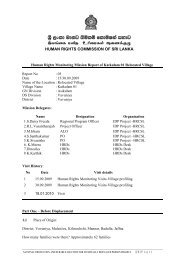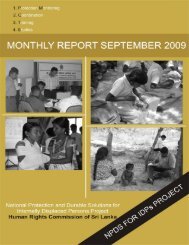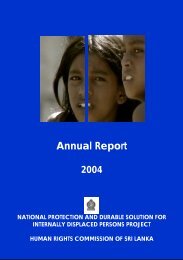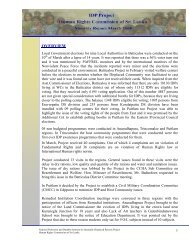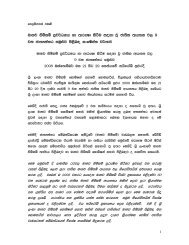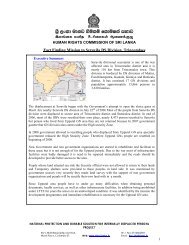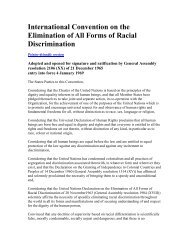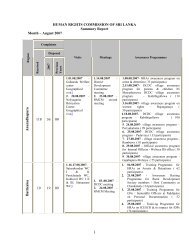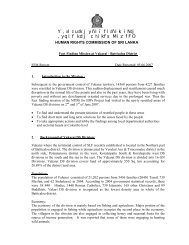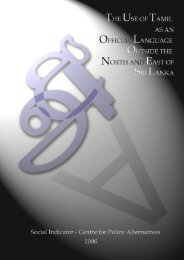Right to Health of Internally Displaced Persons - IDP SriLanka
Right to Health of Internally Displaced Persons - IDP SriLanka
Right to Health of Internally Displaced Persons - IDP SriLanka
You also want an ePaper? Increase the reach of your titles
YUMPU automatically turns print PDFs into web optimized ePapers that Google loves.
However though there is a scarcity <strong>of</strong> human resources and the legal<br />
duties <strong>of</strong> the preventive health sec<strong>to</strong>r are being unable <strong>to</strong> fulfill, the<br />
dedicated health staff have managed <strong>to</strong> prevent further health disasters<br />
following the disasters. But in some areas, it was reported that though<br />
they have sufficient staff, day <strong>to</strong> day visits are not being done and due <strong>to</strong><br />
lack <strong>of</strong> moni<strong>to</strong>ring system regarding their conduct.<br />
The changes <strong>to</strong> ethnic composition <strong>of</strong> some districts after displacement,<br />
have also posed some administrative issues in public health sec<strong>to</strong>r. In<br />
Puttalam, in 1981 there were 83 % <strong>of</strong> Sinhalese, 17 % <strong>of</strong> Tamil speaking<br />
persons. However in 2001; the Tamil speaking people in the district has<br />
been increased up<strong>to</strong> 26 %t because <strong>of</strong> the large number <strong>of</strong> displaced<br />
Muslim community from the Northern Province after 1989. Therefore it<br />
is obvious administrative decisions such as the language ability <strong>of</strong> the<br />
government staffs should be revised according <strong>to</strong> the new statistics at<br />
least in the relevant areas. For instance, in Puttalam MOH area there<br />
about 25,000 Tamil speaking <strong>IDP</strong>s and among 4 PHIs only one can speak<br />
Tamil and among 19 PHMs only 3 can manage with Tamil language.<br />
Language <strong>of</strong> these staffs is imperative because in relocations, the<br />
knowledge on environmental sanitation and family health issues have <strong>to</strong><br />
be communicated <strong>to</strong> the displaced community by these <strong>of</strong>ficers.<br />
7.3. Shelter, water, sanitation and hygiene and disease prevalence<br />
<strong>Right</strong> <strong>to</strong> adequate housing, water, sanitation and hygiene is clearly<br />
enshrined in the human rights sphere. These rights are combined with<br />
other human rights such as right <strong>to</strong> live in security and with dignity.<br />
However, concerning displaced people this is quite different. After<br />
loosing their natural habitats and wealth, they are compelled <strong>to</strong> live<br />
either in community centers or with their friends and relatives. It was<br />
very much obvious during the study that the basic living standards <strong>to</strong> live<br />
in dignity are not being observed at the temporary shelters, welfare<br />
centers and in relocations. It is estimated that this catastrophe is being<br />
49<br />
“Population by ethnic group and district, Census 1981 & 2001” ,Department <strong>of</strong><br />
Census and Statistics <strong>of</strong> Sri Lanka,<br />
http://www.statistics.gov.lk/Abstract_2006/abstract2006/table%202007/CHAP%202/<br />
AB2-11.pdf<br />
50<br />
Observed in discussion with MOH Puttalam.<br />
45



